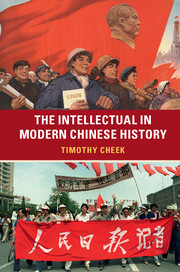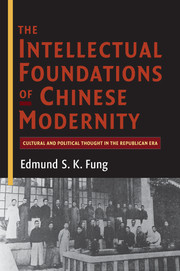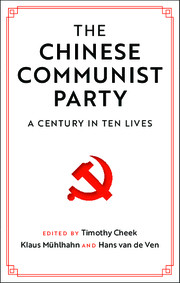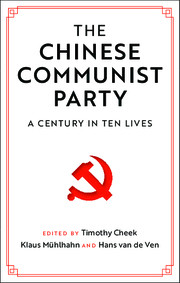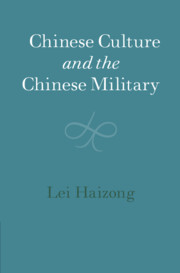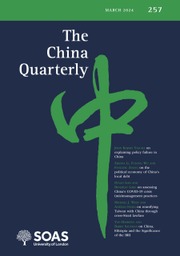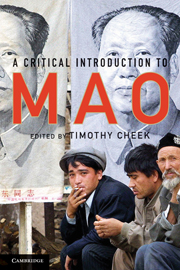The Intellectual in Modern Chinese History
This vivid narrative history of Chinese intellectuals and public life provides a guide to making sense of China today. Timothy Cheek presents a map and a method for understanding the intellectual in the long twentieth century, from China's defeat in the Sino-Japanese war in 1895 to the 'Prosperous China' since the 2008 Beijing Olympics. Cheek surveys the changing terrain of intellectual life over this transformative century in Chinese history to enable readers to understand a particular figure, idea or debate. The map provides coordinates to track different times, different social worlds and key concepts. The historical method focuses on context and communities during six periods to make sense of ideas, institutions and individual thinkers across the century. Together they provide a memorable account of the scenes and protagonists, and arguments and ideas, of intellectuals and public life in modern China.
- A comprehensive synthesis of modern Chinese history across the twentieth century, presenting the importance of intellectuals in public life in modern China
- Places the Chinese experience in a global context from 1895 to the present, making it comparable with European and world events
- Introduces new analytical perspectives for the study of intellectual history, including ideological moments, the directed public sphere and worlds of intellectual life
Reviews & endorsements
"We have long needed a clear, overarching view of the relationship between ideas and the people who articulate them on the one hand and the political system that they try to influence on the other. Finally, Timothy Cheek has produced a clear, articulate, and convincing guide to this complicated and elusive subject. We are all in his debt."
Joseph Fewsmith, Boston University
"This learned volume draws on generations of academic scholarship to present an empathetic and compelling history of Chinese intellectuals in their engagement with the modern world. At once a historiographical essay and a historical narrative, it traces the construction of certain key concepts - 'the people', 'Chineseness' [and] 'democracy' among them - through several structural transformations of the public sphere. Thoughtfully framed and lucidly argued, this volume reshapes the general understanding of modern Chinese history. It is a tour de force of originality, a must-read for specialists, and highly recommended to all interested readers."
Wen-hsin Yeh, University of California, Berkeley
"At the crossroads of many disciplines, intellectual history has emerged as a vital stimulus to the study of modern China as a whole. This important and pathbreaking book makes a very convincing effort toward the reconstruction of the crucial role of the intellectuals and of intellectual life within the larger project of creating a modern China. It moves beyond conventional and too easy parameters such as collaboration versus dissidence, and it compellingly situates its own research agenda within current debates in the study of intellectuals. This book is sure to become a landmark, not just for Chinese intellectual historians, but for anyone with an interest in the making of modern China."
Klaus Mühlhahn, Freie Universität Berlin
"Timothy Cheek's new book provides the most comprehensive, insightful, and accessible study to date of the lives and thoughts of Chinese intellectuals over the past century or so. The spectrum of intellectual debate and opinion that Cheek unfolds goes well beyond conventional representations of the Chinese intellectual as dissident, confronting us instead with a wide variety of individual voices, but also with genuine continuity in ongoing debate about key social and political concepts that have occupied China's best thinkers' minds from the end of the Empire to the present day."
Michel Hockx, School of Oriental and African Studies, University of London
"In this wide-ranging study, Timothy Cheek offers one of the most intimate ways to understand modern China - through the preoccupations and dilemmas of its most gifted thinkers in the previous century."
Pankaj Mishra
'This is a big book full of big ideas written in a generous spirit with an appealingly light touch. It is lucid and accessible and it moves us forward in the way that we understand intellectuals in modern Chinese history, the way we think about what modern Chinese intellectuals mean to ‘us', and in urging that we go beyond merely working on Chinese intellectuals to working with them.' Timothy B. Weston, The China Journal
Product details
November 2016Adobe eBook Reader
9781316354858
0 pages
0kg
6 b/w illus. 1 map
This ISBN is for an eBook version which is distributed on our behalf by a third party.
Table of Contents
- Introduction: for the public good
- 1. Reform: making China fit the world (1895–1915)
- 2. Revolution: awakening new China (1915–35)
- 3. Rejuvenation: organizing China (1936–56)
- 4. Revolutionary revival: overthrowing the lords of nation-building (1957–76)
- 5. Reviving reform: correcting revolutionary errors (1976–95)
- 6. Rejuvenation: securing the Chinese dream (1996–2015)
- Conclusion: intellectuals, China and the world
- Who's who: intellectuals featured in the main text
- Further reading
- Bibliography
- Index.

